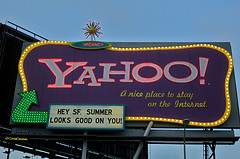Good-Bye Alta-Vista, Delicious


I've read several pieces bemoaning the end of Delicious. As Marshal Kirkpatrick points out in his piece on the end of Delicious:
It's a loss not just for the many people who used Delicious to archive links of interest to them around the web, it's a loss for the future -- for what could have been. Five years later, people are just beginning to appreciate the value of passively published user activity data made available for analysis, personalization and more. That could have been you, Delicious.
He's right, of course, but other services, such as StumbleUpon can take its place. No, StumbleUpon is not the same as Delicious, but I suspect most Delicious users will be able to migrate to it and not miss their old home much after a few months.
The story I find sad is the ignoble end for AltaVista. You see AltaVista could have been a contender. Heck, AltaVista could have been the champ. AltaVista was Google before there was Google.
If you came to the Web before AltaVista came along you would have been horrified by what passed for Web search engines and the pre-Web search engines like WAIS and Gopher.
Back then, in the early 90s, we thought they were great. Well, they were, compared to wandering at random and relying upon the suggestions of friends to find cool and useful Internet and Web sites, which is what we had been doing. When Yahoo stared in 1994 it was just a way for two graduate student friends, David Filo and Jerry Yang, to share their bookmarks. Now, it's old hat, but in its day Yahoo! was revolutionary. For many years, Yahoo! was the organized guide to the Web.
Yahoo! was great, but you still had to navigate your way through what seemed like "a maze of twisty little categories, all alike." Then, AltaVista with its simple search box interface, that any contemporary Google user would recognize at a glance, and you could suddenly find whatever you wanted on the Web without already having a good idea where it was or being a master of Boolean expressions.
AltaVista was great. AltaVista was wonderful. In its brief heyday, about 1995 to 1997, AltaVista was the engine. Its corporate owner even started to offer other related services such as a local version of AltaVista for your PC or intranet and an e-mail service. Sound like any other big search company you might know?
So why aren't we saying, "I just AltaVistaed him and I don't think he's right for us." It's not that Google was so much better from day one. It wasn't. Unfortunately for AltaVista it was cursed with lousy management and a constant ownership changes. Harry McCracken can explain it better than I can:
The service [AltaVista] probably would have run into trouble no matter what-it seemed to be doomed to suffer from mismanagement and/or benign neglect from the get-go, at first from its inventor, Digital Equipment Corporation, which treated it as a technology demo rather than a potentially massive business. It was then owned by Compaq (1998-1998) CMGI (1999-2003), Overture (2003), and Yahoo (2003 to present-it picked up AltaVista along with Overture, not because it wanted to own it). Yes, that's five owners in five years.
Need I say more?
Now, my only question is how long will it take Yahoo to follow these services down the drain? As far as I'm concerned when Yahoo! let its search engine brain be replaced by Microsoft's Bing in July 2009I thought it had become a dead company walking.
Just look at the numbers. For November 2010 comScore showed Yahoo as having 16.4% of U.S. searches. In July 2009, Yahoo had 19.3%. Yahoo is continued its slow decline.
When Yahoo! CEO Carol Bartz came on board, her job was to turn Yahoo! Around. Since, Bartz's dumped projects like the open-source e-mail server Zimbra, fired some employees, and a year and a half after the Microsoft search and ad deal was made, it's shown little effect on Yahoo's bottom line.
Now, maybe as Bartz said during the last earnings call, "First you walk, then you run, then you fly," and once Yahoo has fully transited to Microsoft's adCenter platform in the U.S. and Canada, "then we can really fly." I wish I could believe her. As I say good-bye to Delicious and AltaVista, I wonder just how much longer it will be before I see Yahoo! crashing instead of flying.